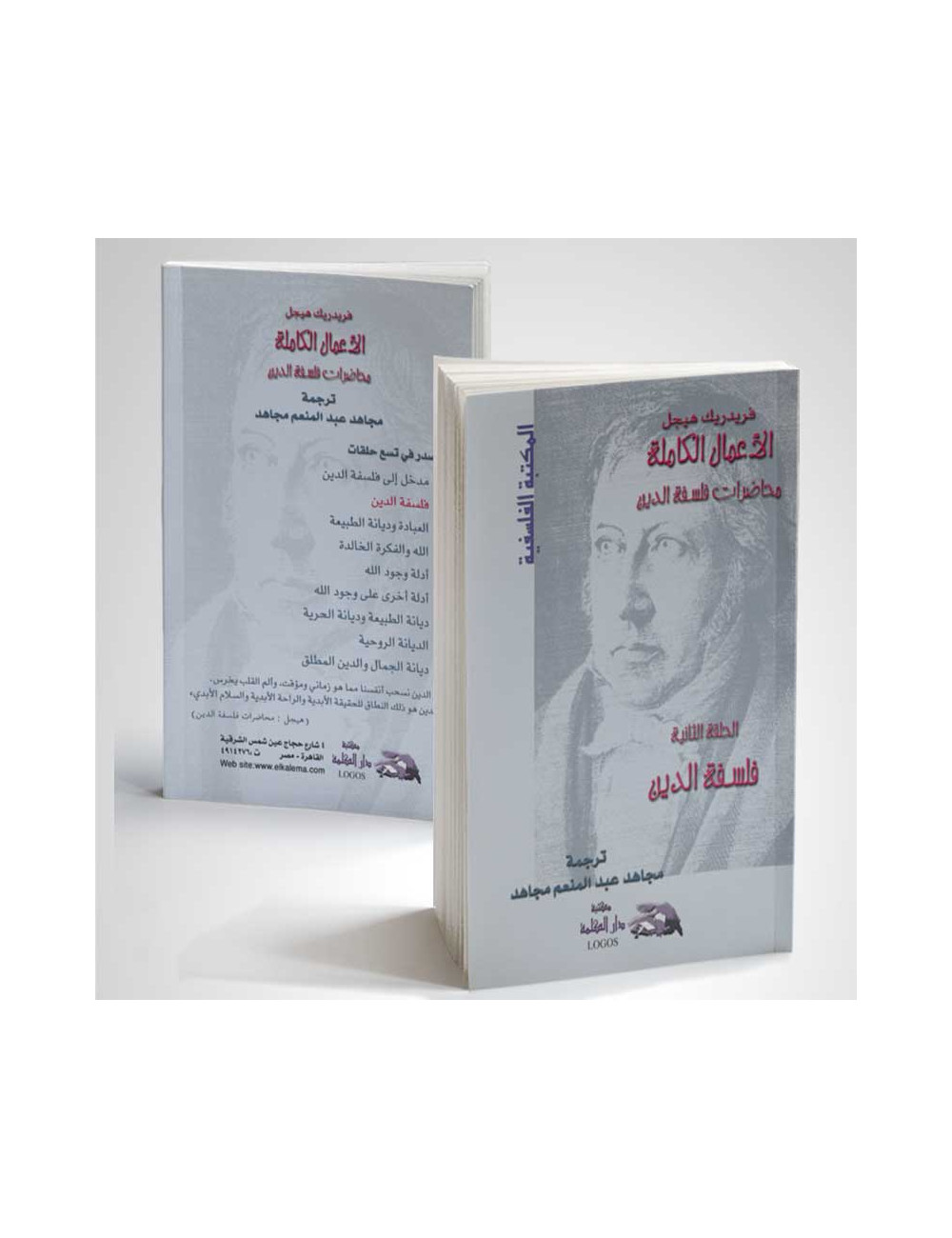- On sale!


What we must begin with is the question: How can a beginning be formed? This - at least - is a formal requirement for all sciences, and for philosophy in particular, and that there is nothing that must find a place for it in it that does not occur with proof.
Security policy
Delivery policy
Terms And Conditions
When the beginning is from what should be posed, nothing has been proven yet, for we have not yet fallen within the scope of the outcome, of what is being mediated, or established through something else. And in our approach to the beginning of what we have to deal with what is direct. Other sciences have an easy side in this regard. Their topic is already before us. And so in geometry - for example - there is a beginning that has formed because there is a space or a point. Here there is no place to prove a thing because its existence is something that is directly recognized.
Product |

Sale!
Lectures on the philosophy of religion: The Philosophy of Religion
|
 Studies in aesthetics
Studies in aesthetics
|

Sale!
Lectures on the philosophy of religion: Spiritual Religion
|
 The Shaking of the Foundations
The Shaking of the Foundations
|
Availability |
In Stock
|
|
In Stock
|
in stock
|
Price |
E£110.00
|
E£110.00
|
E£110.00
|
E£110.00
|
Description |
What we must begin with is the question: How can a beginning be formed? This - at least - is a formal requirement for all sciences, and for philosophy in particular, and that there is nothing that must find a place for it in it that does not occur with proof. |
The higher is also the deepest, and in it the separate moments are grouped together in the subsequent pigmentation of the subjective unity, the need for the interconnectedness that characterizes directness is eliminated, and the separate moments are returned to the subjective unity. |
This book is the companion piece to The Eternal Now and The New Beinشg. This is the most profound and important book of the three. Very readable (in contrast to acedemic theology) because these sermons were delivered live. Definitely Spirit-guided ministry. This work is very important in helping us to understand the difference between small spirit and large Spirit. |
|
ISBN |
977-6010-38-5 | 978-977-384-303-8 | 977-6010-66-0 | 978-977-6010-28-8 |
Author |
Georg Wilhelm Friedrich Hegel | Mejahed Abdelmeaim mejahed | Georg Wilhelm Friedrich Hegel | Paul Tillich |
Translator |
Mejahed Abdelmeaim mejahed | Mejahed Abdelmeaim mejahed | Mejahed Abdelmeaim mejahed | Mejahed Abdelmeaim mejahed |
illustrator |
Mejahed Abdelmeaim mejahed | |||
Original Language |
English | English | English | English |
Language |
Arabic (Translated) |
Arabic (Translated) English |
Arabic (Translated) | Arabic (Translated) |
Format |
Paperback | Paperback | Paperback | |
Publishing House |
Maktabet Dar El Kalema Publishing House | Maktabet Dar El Kalema Publishing House | Maktabet Dar El Kalema Publishing House | Maktabet Dar El Kalema Publishing House |
Number of Pages |
190 | 164 | 142 | 188 |
Product Dimensions |
20.5×13.5×0.8 | 20.4*12.8*0.8 | 20×14×0.5 | 20×13.5×1 |
Product Weight |
178 gm | 190gm | 142 gm | 166 gm |
|
|
|
|
|
The masterpiece of one of the preeminent Talmudic scholars of the 20th century, the multivolume Legends of the Jews gathers together stories from the Talmud, the Midrash, the Bible, and oral traditions-also known as the Haggada-and offers them in chronological order. Volume I, first published in 1909, features tales of The Creation of the World, The Birth of Cain and Noah, The Birth of Abraham, and The Birth of Esau and Jacob-The Favorite of Abraham. A work of brilliant erudition and deep devotion, this is an invaluable collection of religious lore. American rabbi LOUIS GINZBERG (1873-1953) founded the American Academy of Jewish Research and was a prolific contributor to the Jewish Encyclopedia.
This book is both a testament to a great thinker and a still vital strand of thought in the comprehension and critique of the modern organized world. It is essential reading for younger scholars and a radical reminder for those steeped in the tradition of a critical theory of society.
Christianity has been a central force in the shaping of western culture. It is not surprising, therefore, that the greatest artists down the centuries have sought to paint its story. This book tells the history of Christian art, exploring the purpose behind the masterpieces and looking at the context in which they were created. The modern secular reader who feels detached from the meaning of the paintings will be helped to understand their emotional as well as their asethetic power. And the Christian reader will be encouraged to explore further the wonder and beauty of the Christian cultural legacy. The book includes a final chapter on the way modern artists are continuing and changing the legacy.
Four simple questions are asked for each of the sixty different Bible persons or events. These simple questions, drawn from the lives of all the main characters of the Bible, and covering all the main events, will delight, challenge, and amuse. All the best-loved stories are here, brought to life by the Italian artist Paola Bertolini Grudina's lively illustrations.
In this provocative book, the distinguished author writes to break the deadlock in the struggle between the instinctivism of Konrad Lorenz and behavior psychologist B.F. Skinner.
First published in 1968, the year of international-student confrontation and revolution, this classic challenges readers to choose which of two roads humankind ought to take: the one, leading to a completely mechanized society with the individual a helpless cog in a machine bent on mass destruction; or the second, being the path of humanism and hope.
In five sections—Image, Blood, Head, Spirit, and Pain—the acclaimed surgeon and the award-winning writer unlock the remarkable, living lessons contained in our physical makeup. This Gold Medallion Award-winning book will open your eyes to the complex miracle of the human body, and the even more compelling spiritual truths that it reflects.
A classic in its own time...The original self-help treatise that has inspired countless numbers of men and women throughout the world. Learn how love can release hidden potential and become life's most exhilarating experience. In this fresh and candid work, renowned psychoanalyst Erich Fromm guides you in developing your capacity for love in all its aspectsromantic love, love of parents for children, brotherly love, erotic love, self-love, and love of God. Read by a professional narrator...
During the last century the Christian faith has made massive inroads into areas dominated by traditional and fold religions. In many cases, however, varieties of syncretism have developed, both in the countries of origin and in the West.
The contemporary church dismisses Christianity's foundational Scriptures at its own peril. However, the teachings of the Old Testament are less and less at the center of congregational preaching and conversation. The early church fathers visionaries such as Augustine, Origen, and Tertullian embraced the Hebrew Scriptures, allowing the Old Testament to play a central role in the formation...
What is art criticism?
What are the boundaries between art criticism and social criticism?
What are the different streams of criticism?
What is the contemporary critical landscape?
Spiritual growth is not only about coming back into a relationship with God and each other, and about pursuing a pure life, but it is also about coming back to life—the life God created for people to live. This life of deep relationship, fulfilling work, celebration and more, gives us the life we desire and […]
Reidar Thomte's Kierkegaard's Philosophy of Religion is an excellent read for students beginning their study of one of the "greats" of the nineteenth and twentieth century philosophy. Thomte directly appropriates Kierkegaard's insightful language and discussion of theological and philosophical issues that stimulated him, all of which are still alive and well today.
The world houses people equally with natural things. When the world is thus treated as a gathering or even a gathering of natural things, it is not conceived as nature, and we do not understand that it is something that is in itself a holistic system, a system of regulations and arrangements, especially laws.

What we must begin with is the question: How can a beginning be formed? This - at least - is a formal requirement for all sciences, and for philosophy in particular, and that there is nothing that must find a place for it in it that does not occur with proof.

Product Comments